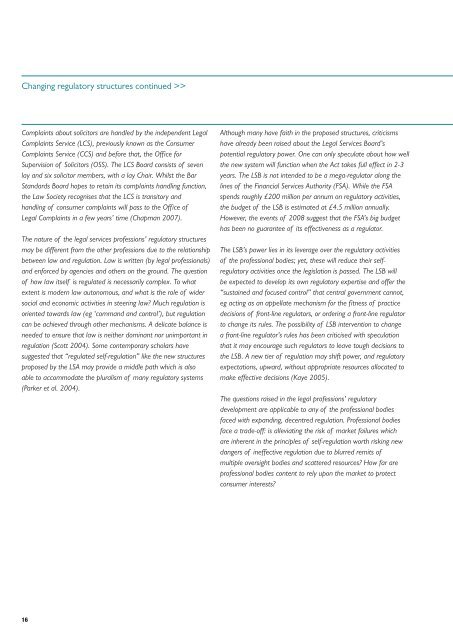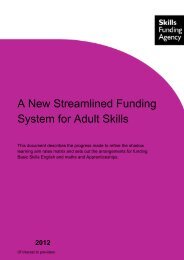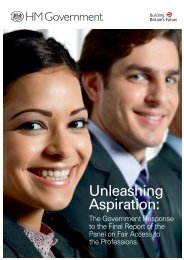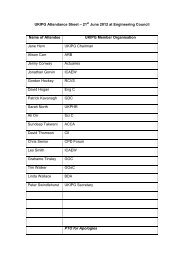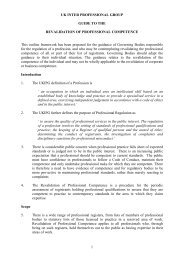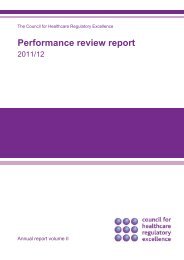BRITISH PROFESSIONS TODAY: THE STATE OF ... - Property Week
BRITISH PROFESSIONS TODAY: THE STATE OF ... - Property Week
BRITISH PROFESSIONS TODAY: THE STATE OF ... - Property Week
You also want an ePaper? Increase the reach of your titles
YUMPU automatically turns print PDFs into web optimized ePapers that Google loves.
Changing regulatory structures continued >><br />
Complaints about solicitors are handled by the independent Legal<br />
Complaints Service (LCS), previously known as the Consumer<br />
Complaints Service (CCS) and before that, the Office for<br />
Supervision of Solicitors (OSS). The LCS Board consists of seven<br />
lay and six solicitor members, with a lay Chair. Whilst the Bar<br />
Standards Board hopes to retain its complaints handling function,<br />
the Law Society recognises that the LCS is transitory and<br />
handling of consumer complaints will pass to the Office of<br />
Legal Complaints in a few years’ time (Chapman 2007).<br />
The nature of the legal services professions’ regulatory structures<br />
may be different from the other professions due to the relationship<br />
between law and regulation. Law is written (by legal professionals)<br />
and enforced by agencies and others on the ground. The question<br />
of how law itself is regulated is necessarily complex. To what<br />
extent is modern law autonomous, and what is the role of wider<br />
social and economic activities in steering law? Much regulation is<br />
oriented towards law (eg ‘command and control’), but regulation<br />
can be achieved through other mechanisms. A delicate balance is<br />
needed to ensure that law is neither dominant nor unimportant in<br />
regulation (Scott 2004). Some contemporary scholars have<br />
suggested that “regulated self-regulation” like the new structures<br />
proposed by the LSA may provide a middle path which is also<br />
able to accommodate the pluralism of many regulatory systems<br />
(Parker et al. 2004).<br />
Although many have faith in the proposed structures, criticisms<br />
have already been raised about the Legal Services Board’s<br />
potential regulatory power. One can only speculate about how well<br />
the new system will function when the Act takes full effect in 2-3<br />
years. The LSB is not intended to be a mega-regulator along the<br />
lines of the Financial Services Authority (FSA). While the FSA<br />
spends roughly £200 million per annum on regulatory activities,<br />
the budget of the LSB is estimated at £4.5 million annually.<br />
However, the events of 2008 suggest that the FSA’s big budget<br />
has been no guarantee of its effectiveness as a regulator.<br />
The LSB’s power lies in its leverage over the regulatory activities<br />
of the professional bodies; yet, these will reduce their selfregulatory<br />
activities once the legislation is passed. The LSB will<br />
be expected to develop its own regulatory expertise and offer the<br />
“sustained and focused control” that central government cannot,<br />
eg acting as an appellate mechanism for the fitness of practice<br />
decisions of front-line regulators, or ordering a front-line regulator<br />
to change its rules. The possibility of LSB intervention to change<br />
a front-line regulator’s rules has been criticised with speculation<br />
that it may encourage such regulators to leave tough decisions to<br />
the LSB. A new tier of regulation may shift power, and regulatory<br />
expectations, upward, without appropriate resources allocated to<br />
make effective decisions (Kaye 2005).<br />
The questions raised in the legal professions’ regulatory<br />
development are applicable to any of the professional bodies<br />
faced with expanding, decentred regulation. Professional bodies<br />
face a trade-off: is alleviating the risk of market failures which<br />
are inherent in the principles of self-regulation worth risking new<br />
dangers of ineffective regulation due to blurred remits of<br />
multiple oversight bodies and scattered resources? How far are<br />
professional bodies content to rely upon the market to protect<br />
consumer interests?<br />
16


